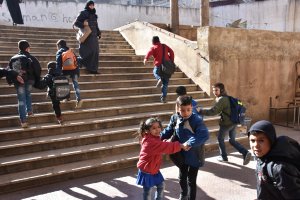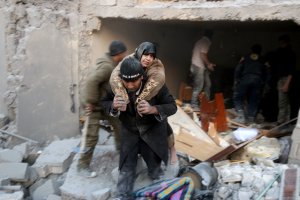Syrian regime forces pounded eastern Aleppo with airstrikes for a sixth straight day Sunday, bringing the death toll to almost 300 in the most intense bombing since the war began five years ago, rescuers say.

Among the latest reported violence: a suspected chemical attack that killed four children and their parents. Two activist groups — the UK-based Syrian Observatory for Human rights and Aleppo Media Center — said a barrage of barrel bombs struck their neighborhood, al-Sakhour.
The Syrian regime resumed heavy bombardment over eastern Aleppo on Tuesday after a three-week lull, killing at least 289 people by Saturday, according to the Syrian Civil Defense, also known as White Helmets.
“This is the heaviest bombardment I have seen in the past five years,” said Ismail Abdallah from the White Helmets.
At a time when hospitals are desperately needed, few have withstood the relentless bombardment — not a single one is operating at full capacity, the Syrian American Medical Society told CNN.
UN Secretary-General Ban Ki-moon condemned the assault and “indiscriminate shelling” for killing and maiming scores of civilians, including children, and for leaving eastern Aleppo without a functioning hospital.
“The secretary-general reminds all parties to the conflict that targeting civilians and civilian infrastructure is a war crime,” the statement said. “Those responsible for these and other atrocities in Syria, whoever and wherever they are, must one day be brought to account.”
Disturbing video shows devastated family
A video from the Aleppo Media Center shows the toll in one neighborhood.
Five bodies — three children, two adults — are visible in the bed of a truck, covered in colorful blankets in the cold air. Their neighbors surround them in the street covered with rubble from bombed buildings.
The mother wears a lavender, black and pink headdress and red sweater. The father wears a heavy off-white or tan sweater while the two boys died in dark blue sweaters, matching their skin; a toddler girl is clad in a baby-blue one, emblazoned with a cartoon character.
Their eyes stare, their mouths are agape.
“We were sleeping when a barrel bomb fell near our home,” a man explains on the video. “We went down and discovered it was chlorine gas. The victims weren’t activists or anything … but they were suffocating so much, they turned blue. It was a man, four kids, and his wife. The oldest boy was 10 years old. Why did this happen? May God curse you, Bashar (al-Assad).”
Another man shows coins to the videographer from the Aleppo Media Center, which appear tarnished. The man says he took the coins from the pockets of the dead. “The gas caused them to change color,” he says.
They weren’t the only fatalities from the suspected gas attack. A young man says his family was asleep at 1 a.m. when they were awakened by an explosion.
“We came down and started choking. We discovered it was chlorine gas,” he said. “My mother was suffocating and my brother-in-law started foaming at the mouth.”
‘Aleppo is a Holocaust’
Syria’s grinding five-year conflict has devastated Aleppo, divided between government-controlled areas in the west and rebel positions in the east.
The regime, backed by Russian air power, has decimated much of eastern Aleppo with aerial bombardments in recent months, and analysts have said the intensified air raids are a sign the regime may be planning a ground offensive to wrest control of the area.
A government siege on eastern Aleppo since July has essentially cut the area off from the rest of the world — a stranglehold tactic that the Syrian regime is infamous for.
Today, eastern Aleppo is desperately short of food, medicine and fuel supplies, while the roads are full of rubble from destroyed buildings. The sound of bombings and news of children dying are the norm.

“Inside the city of Aleppo is a Holocaust,” an Aleppo resident, who describes himself as an independent media activist, told CNN.
He said neighbors and families were sharing what little food they had left to survive.
The United Nations has pushed to get into the area to deliver aid, and on Sunday it announced it had designed a detailed humanitarian plan to provide assistance and medical evacuations from Syria. It said it had shared the plan with all parties in the conflict, as well as its member states.
“It is imperative all parties agree to the plan and allow us to secure immediate, safe and unimpeded access to provide relief to those most in need in east Aleppo, but equally in all other parts of Syria where there are people in need,” read a joint statement from Syria Humanitarian Coordinator Ali Al-Za’tari and Regional Humanitarian Coordinator for the Syria Crisis and Kevin Kennedy.
Children in the crosshairs
Meanwhile, in regime-held western Aleppo, rebel rocket fire hit a school in the government-held al-Furqan neighborhood, Syrian Foreign Minister Walid al-Mouallem said at a news conference in Damascus.
He said 10 students were killed in the attack, while the state-run news agency SANA put the number at eight.
“What did those kids do to die? I am sad about these students’ death,” he said.
A student at Aleppo University in the west told CNN that security forces had gathered students in the university’s main square on Sunday to protest against rebels in eastern Aleppo.
The student, who CNN is not naming for security reasons, also said they had been told to appeal to the United Nations to have opposition armed groups removed from the east so the siege on civilians can be lifted.
It is unclear how many children have died in the attacks, but at least eight have been reported killed in eastern Aleppo, and eight in the city’s west. Activists said there were likely to be more children among the dead.
‘Stop bombing hospitals’
Medical charities have renewed calls on the regime to stop targeting health facilities.
“For the first time, eastern Aleppo is out of hospitals operating at full capacity,” said Dr. Mazen Kewara, director of the Syrian American Medical Society’s Turkey office.
Several major trauma hospitals have been knocked out of service, the organization said, while three floors were destroyed in eastern Aleppo’s only dedicated children’s hospital, forcing the evacuation of babies, said the charity Doctors Without Borders, which also is known by its French initials MSF.
But activists working in the city said as many as five other hospitals in eastern neighborhoods were still somewhat functional.
Doctors Without Borders emergency coordinator Teresa Sancristoval said Saturday’s bombardment of hospitals marked “a dark day for east Aleppo.”
“The attacks have destroyed entire hospitals, electric generators, emergency rooms and wards, forcing them to stop all medical activities,” she said.
“It is not only MSF that condemns indiscriminate attacks on civilians or civilian infrastructure, including hospitals, but also humanitarian law. The message is simple and I don’t know how to say it any louder: Stop bombing hospitals.”
Staffan De Mistura, the envoy of the United Nations secretary general, met with Syrian Foreign Ministry officials on Sunday and said there was “a total denial of any aerial bombing of hospitals in eastern Aleppo,” Reuters reported.
“We should be allowed to send a verification team to verify the damage in hospitals in eastern and western Aleppo,” he said.






